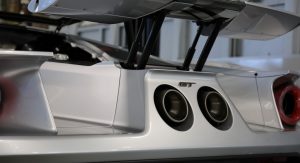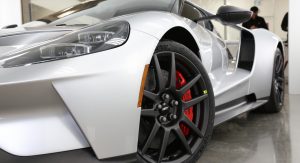Ford’s new GT Competition Series was built with weight-saving in mind, but also with an improved center of gravity for better road-holding.
Among its features, you’ll notice the lightweight carbon fiber racing stripes, A-Pillars and side mirrors, as well as the unique race-inspired Perspex acrylic engine hatch with integrated venting.
Thanks to the manual latch and the carbon fiber prop rod, weight near the roof has been reduced, though Ford engineers went even further in their quest to make the car lighter, by making the bulkhead Gorilla Glass behind the driver about half as thick (and as light) as on other models.
“The Ford GT has racing in its blood,” said Ford exec Raj Nair, while adding that the Competition Series “was developed with the most hardcore track enthusiasts in mind, providing a tailored set of lightweight features and unique livery to match.”
There are also plenty of remaining performance features from the production car, such as the 647 horses, the FIA-certified steel roll cage and active aerodynamic system. However, gone are the air conditioning system, radio & speakers, stowage bins and cup holders. As for standard features, we count the carbon fiber wheels and the titanium lug nuts and exhaust – which are optional extras on the regular model.
The interior boasts Ebony Alcantara suede on the seats, instrument panel and headliner, whereas the console and door sills are wearing exposed carbon fiber. The anodized red paddle shifters and instrument panel badge bring more color to the cabin, whereas the unique center console plate and steering wheel fascia compensate for the missing infotainment controls and screen.
Ford will be offering the Competition Series in six different colors: Shadow Black, Frozen White, Ingot Silver, Liquid Blue, Liquid Grey and Triple Yellow, as North American buyers are free to choose their favorite Ford GT appearance.
The Ford GT Competition Series will be on display this weekend outside Turn One at the Daytona 500, followed by a production run similar to that of the regular model.













